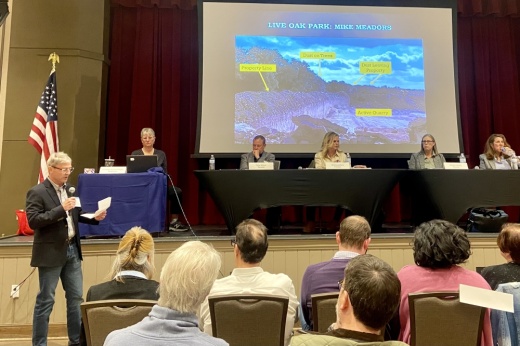Almost 250 people gathered at a forum designed for residents to voice their concerns and a panel of speakers to discuss the issue at Sun City in Georgetown on Feb. 29.
Texas Rep. Terry Wilson, R-Georgetown, and quarry and environmental experts discussed how residents could seek local and legislative change to peacefully coexist with quarries and other aggregate production operations, or APOs, which extract gravel, sand and rock from the earth.
The big picture
Williamson County is home to the most APOs in Texas with 37 registered operations as of March 1, a Texas Commission on Environmental Quality representative told Community Impact. As the county’s APO industry expands, more quarries are located near existing and future residential developments, according to a presentation at the event.
"Quarries are absolutely essential for growth in the area. That's how we build homes, roads [and] bridges. The goal is not to put them out of business, but rather how can we live together more harmoniously," said Christina Schwerdtfeger, panel moderator and retired environmental scientist.
Representatives from several Georgetown-area neighborhoods near quarries shared their concerns, including people living in Berry Creek Highlands, Live Oak Park, Shady Oak Estates and seven neighborhoods in Sun City—a senior living community with more than 9,000 homes.
Residents cited experiencing the following due to quarries:
- Foundation and drywall cracks
- Blastings without warnings
- Poor air quality from dust pollution
- Negative impact on property values
- Loud noise and vibrations
- Loss of vegetation
- Hazardous driving conditions
Jill Shackelford, a former quarry owner, said forming a council with local leaders and quarry operators can bridge the gap between neighborhoods and the quarries affecting them.
Operators can implement practices to reduce dust and noise pollution, including preserving vegetation, covering conveyors, and storing rock crushers in an enclosed space, she said.
“You do have a voice,” Shackelford said. “You need to communicate with the operators that are in this county, and they need to communicate with you.”
What they’re saying
“We chose Live Oak Park for its peacefulness, never expecting the encroachment of the mining operations and their operating companies that prioritize their stone extraction over people's rights to clean air in a safe, clean environment,” Live Oak Park resident Mike Meadors said.
Sun City resident Pat Berthold said the senior community fears poor air quality from dust will negatively impact their health and is seeking for a permanent air quality monitor to be installed nearby. The nearest monitor, which is 7 miles away, has indicated unhealthy air quality, and some residents have experienced respiratory problems, she said.
Michael Spano, a Shady Oaks Estates resident and co-founder of the Coalition for Responsible Environmental Aggregate Mining, said his neighborhood has received no assistance from the city or county despite seeking help.
“When can we come together as quarry operators, as citizens, the city and county to work this out together? Because it needs to happen,” Spano said.
By the numbers
In a survey of residents in the area presented at the event, 97% of respondents reported personally experiencing negative impacts from quarries, specifically:
- 90% felt quarry blasts
- 45% had property damage
- 61% experienced excessive dust
- 55% had vehicle damage
The background
The number of APOs in Texas has drastically grown since 2005 when the state deregulated the industry, Wilson said. In 2005, there were 80 APO permits compared to 1,800 in 2018, he said.
Wilson said he has experienced little success in advancing legislation in the Texas Legislature to mitigate the impact of APOs due to lobbying and a lack of support in the Texas Senate.
Moving forward, Wilson said he wants to incentivize APOs to implement best practices, including using a less impactful computer-based blasting method, monitoring water usage, addressing truck routing to avoid road damage, maintaining specific operating hours and making nondeceptive land purchases.
“We want the industry, but we're not talking about the Texas crushed stones. We're talking about the industry that's literally moving up against our neighborhoods, and there's not a single thing to stop it," Wilson said.





